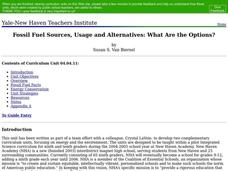Library of Congress
The Harlem Renaissance
The Harlem Renaissance brought forth many American art forms including jazz, and the writings of Zora Neale Hurston and Langston Hughes. Using a carefully curated set of documents from the Library of Congress, pupils see the cultural...
Curated OER
Creating TAKS Handout with WebCCAT
Young scholars will use the lesson plan will integrate WebCCAT a TAKS prep software. The software will be extensions for helping the middle school teachers prepare their students for the upcoming TAKS test.
Curated OER
Integration, the Skill that Binds
Tenth graders use mathematical concepts to help clarify their beliefs, effect solutions, and improve verbal skills. They use the steps common to the scientific methods as an aid in development of cognitive skills.
Curated OER
Changes, Goals, and Expectations
Students define physical, social, emotional, and intellectual changes as a part of developing their career path. In this career growth lesson, students listen to guest speakers discuss personal goals and decisions they've made. Students...
Syracuse University
World War I
World War I was known for its gruesome battlefields and horrific injuries. Using photographs from a battlefield surgeon's scrapbook, scholars see first-hand what life was like in the trenches. After creating a timeline of the war using...
Syracuse University
Harlem Renaissance
The music and literature of the Harlem Renaissance defined American culture, including its poetry. Using a poem from the period, individuals explore its musical qualities and how it is reflective of the period. Then, they use what they...
Center for Civic Education
Citizenship Schools and Civic Education During the Civil Rights Movement and in the Present
Your young historians will discover the importance that citizenship education has played in the social progress of the United States as they learn about early efforts to discourage African Americans from voting in the 1960s.
Curated OER
Probing the Unknown: Artists as Explorers
Students gain an understanding of humans need to explore. They create a "journey map" depicting the accomplishments of artistic explorers, and research the influences that caused the artists to embark on these "explorations."
Curated OER
The Japanese Garden
High schoolers use the internet to gather information on the Japanese Gardens. They discuss topics with a horticulturist and build a replica of the gardens at their school. They work together to identify different types of plants.
Curated OER
Louisa May Alcott: The Candle and the Mirror
Students discuss the life of Louisa May Alcott and create an outline of a biography of her life and times. In this Louisa May Alcott lesson, students explore the Transcendentalist involvement in the abolitionist movement, relating...
Curated OER
Fossil Fuel Sources, Usage and Alternatives: What Are the Options?
Students examine the relationship between energy and the environment. In groups, they participate in experiments to discover the law of thermodynamics and the differences between potential, kinetic and mechanical forms of energy. They...
Curated OER
Activism and Social Reform in America from 1800-1850
Learners discuss idea of social status, examine antebellum social reform movements, and compare and contrast experiences of activists who sought to improve workers' lives, end slavery, reform immigration laws, and establish voting rights...
Curated OER
Separate is Not Equal
Middle schoolers use political cartoons and editorials to study Brown v. Board of Education. In this Brown v. Board of Education lesson, students read the background information on eight cartoons and editorials for a study...
Curated OER
Local and Global Sustainability Unit
Students examine the characteristics that define a sustainable community at the local and global level. They create and prioritize a list of traits, read and discuss a magazine article, and create a poster.
Curated OER
Children and Slavery Document Search
Students review the causes of slavery, the Middle Passage, triangular trade and the spread of slavery throughout colonies. They work in small groups and search documents in order to find the answers to a question and document packet.
















